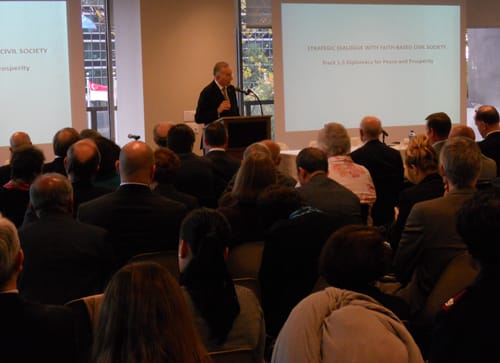IGE Co-sponsors Strategic Dialogue in NYC in Conjunction with U.N. General Assembly Meeting
“Strategic Dialogues with Faith-Based Civil Society: Track 1.5 Diplomacy for Peace and Prosperity”

[Pictured: H.E. Ekmeleddin Ihsanoglu, Secretary General, Organization of Islamic Cooperation, addresses government and faith-based representatives]
On 28 September representatives of several U.N. member states, multilateral organizations, civil society, and other faith-based organizations met to begin discussing the potential for a common platform through which strategic partnerships between governments and faith-based civil society organizations might advance peace and prosperity. This timely and high-level dialogue, held on the margins of the United Nations General Assembly, was co-sponsored by the United States government, the Organization of Islamic Cooperation, IGE, and Religions for Peace International (which hosted the event).
The event reflects the Department of State’s working group on religion and foreign policy, which makes suggestions regarding practical mechanisms through which the State Department and religious communities worldwide can be mutually and better informed and, on occasion, collaborate to build peace.
Dr. William F. Vendley, Secretary General of Religions for Peace opened the high-level dialogue, stating: “We recognize that the identities, mandates and capacities of governments and religious bodies are different. Governmental efforts for problem solving can be called ‘track one’ approaches, while faith-based civil society initiatives can be called ‘track two’ approaches. We want partnerships that respect and retain these differences, but also harness their respective strengths. We are calling these partnerships track ‘1.5.’ Today, we need to reflect on the principles, best practices and new opportunities for these important partnerships.”
Toward that end, the dialogue sought initial feedback on the need for a platform that might facilitate such partnerships, as well as the need to discuss that platform more intentionally—in the comparative context of global lessons learned and best practices—at the 9th World Assembly of Religions for Peace in May of 2013.
U.S. Under Secretary of State for Civilian Security, Democracy, and Human Rights, Maria Otero, emphasized the need for both tracks to engage one another: “Such active and enduring engagement can help us [governments] promote religious freedom and tolerance, mitigate violent conflict, and foster international development. By consulting with faith-based actors, we [governments] ensure that our work is inclusive and sustainable.”
Ekmeleddin Ihsanoglu, the Secretary General of the Organization for Islamic Cooperation, echoed these sentiments, noting that the OIC is looking for “new partners in peace and security matters, certainly with a focus on promoting the role of religious actors and interfaith initiatives, including the initiatives led by women.”
Kenya’s Ambassador to the U.N., Dr. Josephine Ojiambo, described a path ahead, noting how important religion is in local life, how it shapes values, and how it can be mobilized for the common good as a “force of progress.” She also stressed that, by definition, Kenyan diplomacy already included many informal dialogues with faith-based actors, especially with women of faith.
Libya’s Ambassador to the United Arab Emirates, Dr. Aref Ali Nayed, reminded everyone of the positive roles that faith could play in a diverse and mutually respectful society. In eulogizing his friend, Ambassador Chris Stephens, as well as those Libyan citizens subsequently killed during the protests against the terrorists who killed Stephens, Dr. Aref urged those present to keep spiritual values at the forefront as they worked for democracy. He especially encouraged a high regard for the Transcendent, the sacred, shared service, patient persistence, and an acute appreciation for the gifts of diversity, which requires both honesty and listening.
The U.N. Secretary General’s High Representative for the Alliance of Civilizations (AOC), Jorge Sampaio, concluded the dialogue by encouraging everyone to have existing mechanisms through which they can build relationships and discuss issues before they become crises. In particular, Sampaio welcomed partnerships—formal and informal—with the AOC, urging “All sectors, including governments and religious communities, [to] combine forces to develop a more inclusive and tolerent society.”
The meeting ended with unanimous affirmation of the common desire to discuss further and build a practical platform through which governments and religious communities could share lessons learned, best practices, and collaborate as needed, respecting the identities and interests of each.